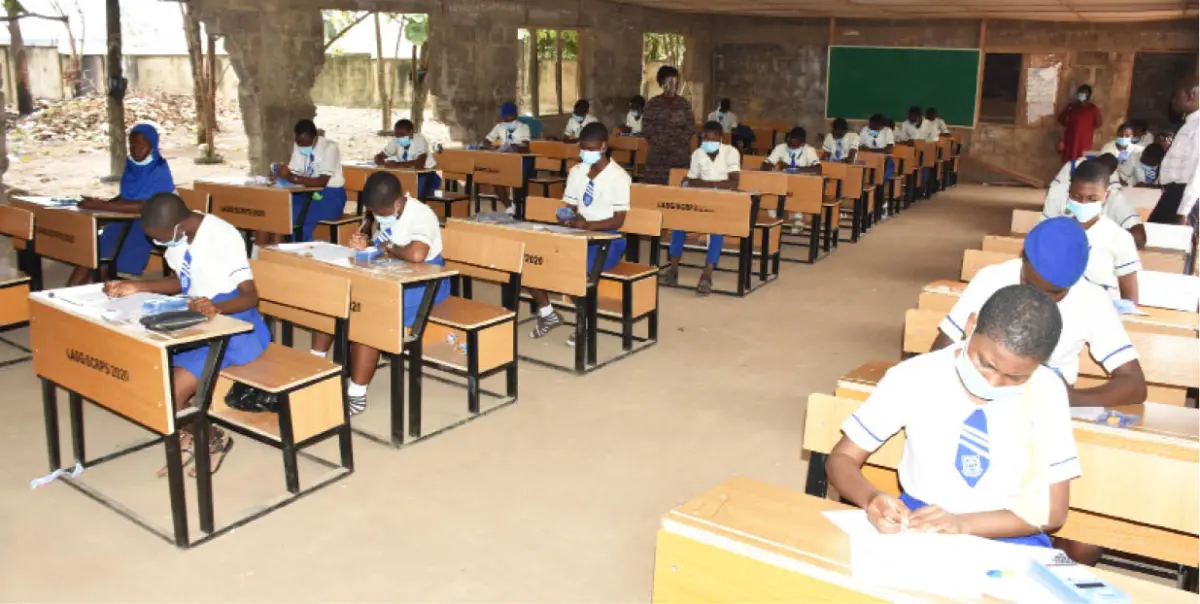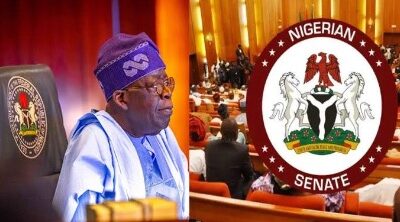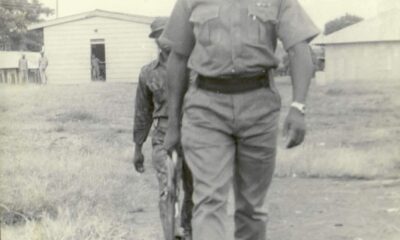Education
Nobel peace prize awarded to Japanese atomic bomb survivors’ group
Survivors of the atomic bombings of Japan almost eight decades ago have won the Nobel peace prize for their campaign to rid the world of nuclear weapons.
The Japan Confederation of A- and H-Bomb Sufferers Organisations – commonly known as Nihon Hidankyo – received the accolade one year before the 80th anniversary of the bombings of Hiroshima and Nagasaki, and at a time of growing concern about the possible use of nuclear weapons.
The Nobel committee said it had decided to award the prize to Nihon Hidankyo “for its efforts to achieve a world free of nuclear weapons and for demonstrating through witness testimony that nuclear weapons must never be used again”.
The Norwegian committee said testimony by hibakusha – survivors of the August 1945 bombings by the US – had “helped to generate and consolidate widespread opposition to nuclear weapons around the world by drawing on personal stories, creating educational campaigns based on their own experience, and issuing urgent warnings against the spread and use of nuclear weapons”.
It added: “The hibakusha help us to describe the indescribable, to think the unthinkable, and to somehow grasp the incomprehensible pain and suffering caused by nuclear weapons.”
Japan’s prime minister, Shigeru Ishiba, who is attending the East Asia summit in Laos, told reporters: “It’s extremely meaningful that the organisation that has worked toward abolishing nuclear weapons received the Nobel peace prize.”
While the committee noted that nuclear weapons had not been used since the end of the second world war, it said the “taboo” against their use was “under pressure”.
The Russian president, Vladimir Putin, has refused to rule out the use of tactical nuclear weapons against Ukraine, while North Korea has continued to develop nuclear weapons that some experts believe are capable of striking the US mainland.
Some will see the prize as a rebuke to Japan’s conservative government, which is dependent for its defence on the US nuclear umbrella and is not among the more than 60 countries that have ratified a 2021 treaty to ban the possession and use of nuclear weapons.
“At this moment in human history, it is worth reminding ourselves what nuclear weapons are: the most destructive weapons the world has ever seen,” the Nobel committee said.
Between 60,000 and 80,000 people died instantly after the Enola Gay, a US B-29 bomber, dropped a 15-kiloton nuclear bomb on Hiroshima on the morning of 6 August 1945, with the death toll rising to 140,000 by the end of the year. Three days later, the Americans dropped a plutonium bomb on Nagasaki, killing 74,000.
Today, the number of people officially recognised as having died from the effects of the bombings stands at 344,306 in Hiroshima and 198,785 in Nagasaki. The average age of the 106,000 survivors is almost 86, according to Japan’s health ministry.
“One day, the hibakusha will no longer be among us as witnesses to history,” the Nobel committee said. “But with a strong culture of remembrance and continued commitment, new generations in Japan are carrying forward the experience and the message of the witnesses.”
Nihon Hidankyo’s co-chair, Toshiyuki Mimaki, 81, told a news conference in Hiroshima that the group’s recognition would give a major boost to its efforts to demonstrate that the abolition of nuclear weapons was possible, Reuters and Agence France-Presse reported.
“It would be a great force to appeal to the world that the abolition of nuclear weapons can be achieved,” Mimaki said. “Nuclear weapons should absolutely be abolished.”
He said the idea that nuclear weapons brought peace was a fallacy. “It has been said that because of nuclear weapons, the world maintains peace. But nuclear weapons can be used by terrorists,” he said. “For example, if Russia uses them against Ukraine, Israel against Gaza, it won’t end there. Politicians should know these things.”
MG Sheftall, the author of Hiroshima: The Last Witnesses, which was published last month, said he was “absolutely elated” by the news. “Since the nadir of the cold war, I don’t think the world has needed renewed awareness of the horror of nuclear weapons more than it needs it now,” he said.
Education
FG Bans Admission, Transfer Of SS3 Students

The Federal Government has announced a nationwide ban on the admission and transfer of students into Senior Secondary School Three (SS3) in all public and private schools, beginning from the 2026/27 academic session.
The announcement, signed by Boriowo Folasade, Director of Press and Public Relations at the Federal Ministry of Education, said the directive was part of efforts to curb examination malpractice and restore credibility to Nigeria’s education system.
“The Federal Government, through the Federal Ministry of Education, has announced a nationwide prohibition on the admission and transfer of students into Senior Secondary School Three (SS3) in all public and private secondary schools,” the statement read.
According to the ministry, the policy follows growing concerns over the increasing incidence of malpractice, including the use of so‑called special centres during external examinations.
It explained that admissions and transfers will now be restricted strictly to Senior Secondary School One (SS1) and Senior Secondary School Two (SS2). “Admission or transfer into SS3 will no longer be permitted under any circumstance,” the ministry stated.
Officials said the measure is aimed at discouraging last‑minute movement of students for examination‑related advantages, ensuring proper academic monitoring, and promoting continuity in teaching and learning.
School proprietors, principals, and administrators nationwide have been directed to comply fully with the policy.
The ministry warned that any violation would attract sanctions in line with existing education regulations and guidelines.
Reaffirming government’s commitment, the statement added: “The Federal Ministry of Education reaffirms the Federal Government’s commitment to maintaining academic standards, promoting fairness, and restoring credibility to public examinations across the country.”
Education
How Fulani Militias Attacked Taraba Community, K!lled My Father, Four Relatives — Grieving NYSC Member Cries Out (Video)

Orkeghen Philip Aondofa, a serving member of the National Youth Service Corps (NYSC), has cried out for help, alleging that armed Fulani herders carried out a de@dly attack on his village — New-Gboko (Nyugoko) in the Peva–Chanchanji Ward of Takum Local Government Area, Taraba State.
They reportedly k!lled his father and four other members of his family.
Philip, who is currently serving in Enugu State, recounted the horror in an emotional interview with SaharaReporters, saying the Taraba State government has remained silent while k!llings continue across communities in Chanchanji ward.
According to him, the attackers, whom he repeatedly referred to as “herders ”, invaded the community on November 27, 2025, unleashing violence that forced all surviving residents to flee.
He said the assailants are still occupying the village, preventing him from retrieving his father’s corpse for burial.
“Right now, as I speak to you, the k!lling is all over Chanchanji ward in Takum LGA of Taraba State. The Taraba State Government is silent about it,” he said.
The corps member said one of the attackers used his late father’s phone to call him after the massacre — only to confess to k!lling him.
“After the attack, one of them took my father’s phone and called me. When I asked where the owner of the phone was, he told me, he k!lled my father directly. I broke down and ended the call,” he said.
Philip said the inability to recover his father’s remains has left him in deeper anguish.
“What pains me the most now is how I will get my father’s corpse to bury. Those herders are still there in the village. There is nobody left in my village.”
The corps member said he is nearing the end of his service year but now feels completely stranded and without hope.
“After my service, I don’t know where to go. I don’t know where to start. I am calling on the Federal Government and those concerned to come to my aid. I am broke, I am hopeless. I don’t have anywhere to go; everything is gone. I have lost hope.”
Education
TETFund Unveils Plan for Nationwide Security Overhaul in Tertiary Institutions

The Tertiary Education Trust Fund (TETFund) has announced a major initiative to strengthen security across universities, polytechnics, and colleges of education in Nigeria. As part of the new move, the Fund is developing a comprehensive security master plan aimed at addressing the growing threats facing campuses nationwide.
According to the Chairman of the Board of Trustees, the framework will serve as a unified guide for preventing, managing, and responding to security breaches within tertiary institutions. He noted that the rising cases of attacks, kidnappings, and other safety concerns have made it imperative to adopt a coordinated national approach to protect students, staff, and infrastructure.
The proposed security master plan is expected to involve collaboration with security agencies, education stakeholders, and institution managers to ensure effective implementation across the country.
-
Business1 year ago
US court acquits Air Peace boss, slams Mayfield $4000 fine
-

 Trending1 year ago
Trending1 year agoNYA demands release of ‘abducted’ Imo chairman, preaches good governance
-

 Politics1 year ago
Politics1 year agoMexico’s new president causes concern just weeks before the US elections
-

 Politics1 year ago
Politics1 year agoPutin invites 20 world leaders
-

 Politics1 year ago
Politics1 year agoRussia bans imports of agro-products from Kazakhstan after refusal to join BRICS
-
Entertainment1 year ago
Bobrisky falls ill in police custody, rushed to hospital
-
Entertainment1 year ago
Bobrisky transferred from Immigration to FCID, spends night behind bars
-
Education1 year ago
GOVERNOR FUBARA APPOINTS COUNCIL MEMBERS FOR KEN SARO-WIWA POLYTECHNIC BORI













